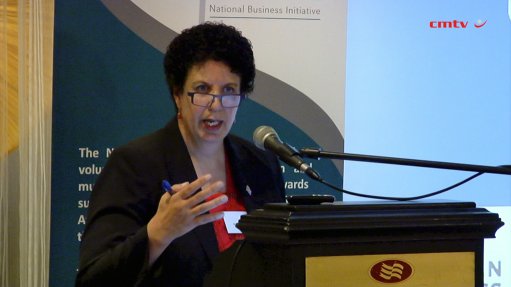
CSIR Natural Resources and Environment executive director May Hermanus
The Council for Scientific and Industrial Research (CSIR) has published the second edition of the South African Risk and Vulnerability Atlas (Sarva), alongside the relaunch of the newly revamped online portal, to help business navigate current research on the risk and vulnerability of key social and economic sectors to climate change.
The Department of Science and Technology- (DST-) led initiative intends to be a central repository of South Africa-specific essential information on the impact of climate change and a wide range of climate and environmental data to enable economic and social sectors to “take informed decisions to avoid risks related to climate change”.
South Africa was facing an increased frequency of extreme weather events, such as droughts, dry spells, heat waves and severe thunderstorms, CSIR natural resources and environment executive director May Hermanus said on Wednesday.
“Africa is particularly vulnerable to climate change, and that’s even if the Paris Agreement is adhered to and the very strict [limit of a] 1.5 degree increase in temperature [above pre-industrial levels] is achievable,” she told delegates at the launch of the revised edition.
The continent is already seeing temperature changes of that magnitude, experiencing a temperature rise about twice that of the global average rate.
This meant that planners and decision-makers need to move from reactive crisis management approaches to proactive climate change and disaster risk management approaches, and Sarva and its digital complement Sarva 3.0 makes available the essential existing knowledge on global change risks and vulnerabilities to enable this approach.
The new portal, which is currently undergoing the final touches, is an online spatial database that directly supports users and allows free access to useful information on the impact of climate change to industries and society.
Hermanus said that the open source platform was available and accessible to anyone who needed it, and unpacked the drivers, pressures, vulnerability, exposure and risks or hazards within a particular location, covering both spatial and non-spatial data sets.
“The portal offers comprehensive resources which include live web mapping, static maps, reports, case studies and integrated analysis which assist in an increased understanding of global change impacts, by building the evidence base for decision-makers and the other stakeholders, as well as the use and interpretation of scientific data for local level planning,” the CSIR described.
“In a data driven world, the importance of analytical tools that can make sense of the plethora of data is self-evident. Proper analysis and the capacity to use such information will inform the innovation and technological improvements that enable South Africa to implement its nationally determined contributions to combat climate change,” said DST deputy director-general for socioeconomic innovation partnerships Imraan Patel.
The National Business Initiative (NBI) is supporting the initiative in an effort to get the business sector on board and take appropriate steps.
“Business is and must remain at the forefront of adaptation planning, including the financing and implementation of solutions,” said NBI programme manager Alex McNamara.